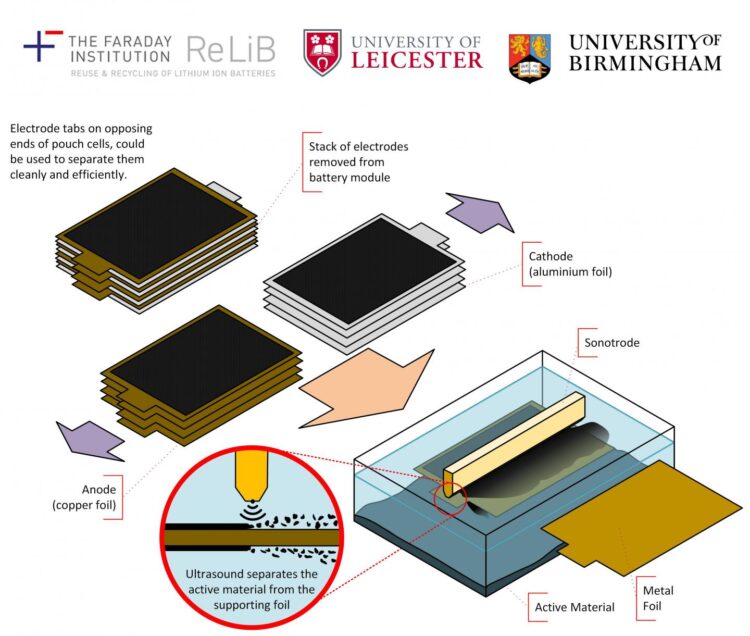Researchers at the University of Leicester have developed a new method to recycle electric vehicle batteries using a ground-breaking new approach that many will have experienced in the dentist’s chair.
The Faraday Institution project on the recycling of lithium-ion batteries (ReLiB) led by Professor Andy Abbott at the University of Leicester used a new method, involving ultrasonic waves, to solve a critical challenge: how to separate out valuable materials from electrodes so that the materials can be fully recovered from batteries at the end of their life.
Current recycling methods for lithium-ion battery recycling typically feed end-of-life batteries into a shredder or high-temperature reactor. A complex set of physical and chemical processes are subsequently needed to produce useable materials. These recycling routes are energy intensive and inefficient.
If an alternate approach is taken and end-of-life batteries are disassembled rather than shredded, there is the potential to recover more material, in a purer state. The disassembly of lithium-ion batteries has been shown to recover a high yield (around 80% of the original material) in a purer state than was possible using shredded material.
The stumbling block – of how to remove and separate critical materials (such as lithium, nickel, manganese and cobalt) from used batteries in a fast, economical and environmentally-friendly way – can now be avoided thanks to the new approach which adapts technology currently in widespread use in the food preparation industry.
The ultrasonic delamination technique effectively blasts the active materials required from the electrodes leaving virgin aluminium or copper. The process proved highly effective in removing graphite and lithium nickel manganese cobalt oxides, commonly known as NMC.
The research has been published in Green Chemistry and the research team led by Professor Abbott have applied for a patent for the technique.
Professor Abbott said:
“This novel procedure is 100 times quicker and greener than conventional battery recycling techniques and leads to a higher purity of recovered materials.
“It essentially works in the same way as a dentist’s ultrasonic descaler, breaking down adhesive bonds between the coating layer and the substrate.
“It is likely that the initial use of this technology will feed recycled materials straight back into the battery production line. This is a real step change moment in battery recycling.”
Professor Pam Thomas, CEO, The Faraday Institution commented:
“For the full value of battery technologies to be captured for the UK, we must focus on the entire life cycle — from the mining of critical materials to battery manufacture to recycling — to create a circular economy that is both sustainable for the planet and profitable for industry.”
Faraday Institution researchers have been focused on the life cycle of the battery – from their first production to their re-use in secondary applications to their eventual recycling, to ensure that the environmental and economic benefits from Electric Vehicle batteries are fully realised.
The research team are in initial discussions with several battery manufacturers and recycling companies to place a technology demonstrator at an industrial site in 2021, with a longer-term aim to license the technology.
The research team has further tested the technology on the four most common battery types and found that it performs with the same efficiency in each case.
###
Notes to Editors
For further information or interview requests, please contact the University of Leicester press office on 0116 252 2160 or [email protected]
A media pack is available on request.
About the University of Leicester
The University of Leicester is led by discovery and innovation – an international centre for excellence renowned for research, teaching and broadening access to higher education. It is among the top 25 universities in the Times Higher Education REF Research Power rankings with 75% of research adjudged to be internationally excellent with wide-ranging impacts on society, health, culture, and the environment. The University is home to just over 20,000 students and approximately 4,000 staff.
Find out more: https:/
About the Faraday Institution
For more information on the Faraday Institution, visit http://www.
Powering Britain’s battery revolution, the Faraday Institution is the UK’s independent institute for electrochemical energy storage research, skills development, market analysis, and early-stage commercialisation. Bringing together expertise from universities and industry, the Faraday Institution endeavours to make the UK the go-to place for the research and development of new electrical storage technologies for both the automotive and wider relevant sectors.
The first phase of the Faraday Institution is funded by the Engineering and Physical Sciences Research Council (EPSRC) as part of UK Research and Innovation. Headquartered at the Harwell Science and Innovation Campus, the Faraday Institution is a registered charity with an independent board of trustees.
Media Contact
Corinne Scotland
[email protected]
Related Journal Article
http://dx.





